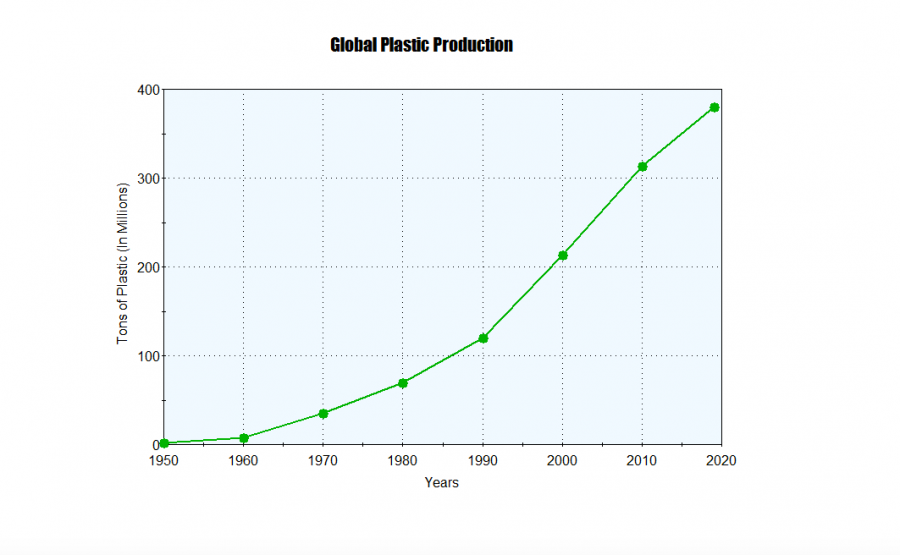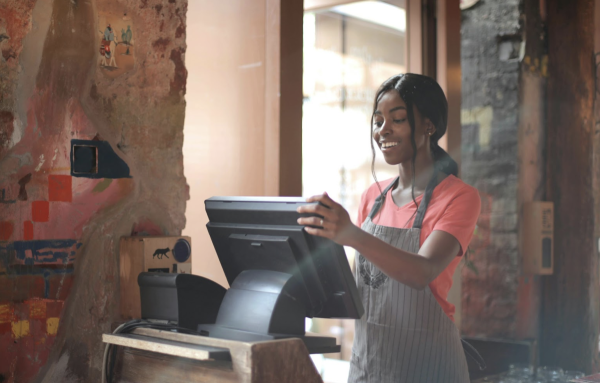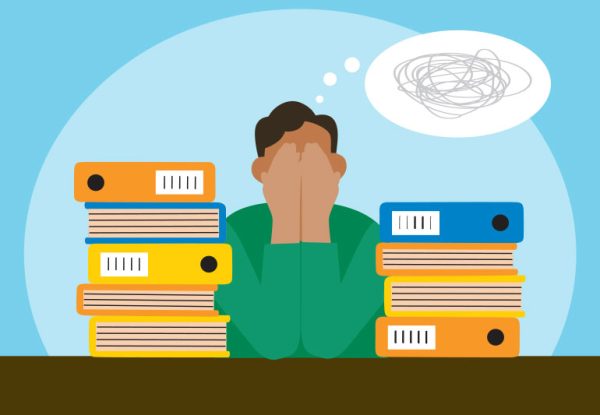Plastic was once a game changer
We are drowning in plastic.
Plastic has infiltrated the Mariana Trench, the deepest known part of the Earth, and can be found covering Mount Everest, the highest point on Earth. It has even been found encircled by Arctic Ice and ingested by sea life.
Plastic waste pollution is mainly due to plastic’s inability to biodegrade. A plastic bag only begins to decompose 100 years after it is thrown away. Yet, the bag never decomposes entirely; it simply becomes pieces of plastic too small for the human eye to see.
These microplastics have become hazardous to human health. AP Environmental Science teacher, Mrs. Praesel, teaches her classes about the lifecycle of a water bottle. She also explains how plastic is becoming hazardous, as it ends up in food and the atmosphere. “The plastic is fused together unnaturally so it is bound to come apart,” she said.
Scientists are beginning to discover copious amounts of microplastics in remote areas of Greenland and the Arctic. With no inhabitants for miles, studies published by Science Advances show that the microplastics were brought to the desolate areas through precipitation.
Although the banning of plastic in some areas is effective, microplastics are still transported through water and air all over the world. Without widespread action, plastic buildup will continue until microplastics infiltrate every aspect of nature.
Taking action against extensive plastic use does not mean making plastic obsolete. Single-use plastic is the primary component of pollution. Commonly found pollutants include plastic bags, straws, and water bottles because they are only able to be recycled a few times. As a result, the United Nations has classified single-use plastic one of the world’s most pressing environmental crises.
Member of the Voorhees Environmental Commission, Lawrence Spellman, believes recycling has become somewhat of a hassle for many and this needs to change. He explains how even as recycling becomes imperative to the health of the planet, it is “unfortunately becoming more cost effective to throw everything away than to recycle.”
However, Spellman continues to encourage people to recycle as he explains, “Until someone figures out how to take recycled plastic and turn it into something useful, like shampoo, this increased cost has to be a short term thing.”
The essentiality of recycling for the health of the planet has intensified as single-use plastic has increasingly become more common. The United Nations Environmental Program found that out of the 8.3 billion tons of plastic created since the 1950’s, only 9% of all plastic waste has been recycled.
As irresponsible plastic use continues, plastic will continue to invade natural wonders. To try and suppress the plastic crisis, many governments are placing restrictions on the use and availability of plastic.
The Mount Everest region has instituted a plastic ban on straws and soda bottles. “If we start now, it will help keep our region, the Everest and the mountains clean long terms,” Ganesh Ghimire, chief administrative officer of the region, told USA Today.
California, New York, and Hawaii have all passed state-wide bans on single-use plastics. The European Union has also outlawed all single-use plastic and require 90% of all beverage bottles to be recycled by 2029. Over 18 countries in Africa have banned plastic bags.
A majority of countries in Asia now refuse to accept shipments full of plastic waste from countries like the United States. After receiving barrels of nonrecyclable plastic waste, China decided to take a stand and end the shipments. Many other countries followed suit.
China has decided to phase out plastic bag use in all major cities by the end of 2020. The country has also taken extensive action against plastic straws and has implemented extensive restrictions on the production of plastic.
Camden County is beginning to try and phase out single-use plastic as all county run events or buildings will now become plastic free. As Camden County takes positive steps towards bettering the environment, they ensure to remind people of the importance of recycling by sending pamphlets to all residents.
Still, as recycling slows in the United States, the government will soon have to decide on how to proceed.
The ultimate issue remains: What will replace single-use plastic if it is outlawed?
Praesel explained how there are tons of alternatives for single-use plastic and it definitely has a place in society’s increasing awareness of climate change.
“A plastic bag ban brings an awareness that people don’t normally have because they have to think about something like bringing a reusable bag,” she said. “It’s a two fold effect.”
Spellman believes glass and aluminum are viable alternatives. He said people need to look past the stigma at “the biodegradable abilities of hemp” as the key to abandoning plastic.
International companies are also willing to give alternative options to plastic a shot. PepsiCo is selling Tropicana orange juice in glass bottles. Disney stores have stopped giving out plastic bags. Starbucks is phasing out plastic straws.
Member of the Voorhees Environmental Commission Natalie Sutherland has followed suit, refusing to use any plastic bags and instead brings along her own reusable bags.
“Single use plastic is something we can learn to live without-again. I think as a society in this culture we have become creatures of habit and convenience,” Sutherland said. “Instant everything in a disposable world. This is not feasible anymore.”
Many others like Sutherland are trying to go single-use plastic free. However, without a worldwide effort, recycling will continue to diminish as single-use plastics continue to build irreversible pollution.
Sutherland summarized, “Every little change adds up to a BIG change and everyone needs to do their part.”











